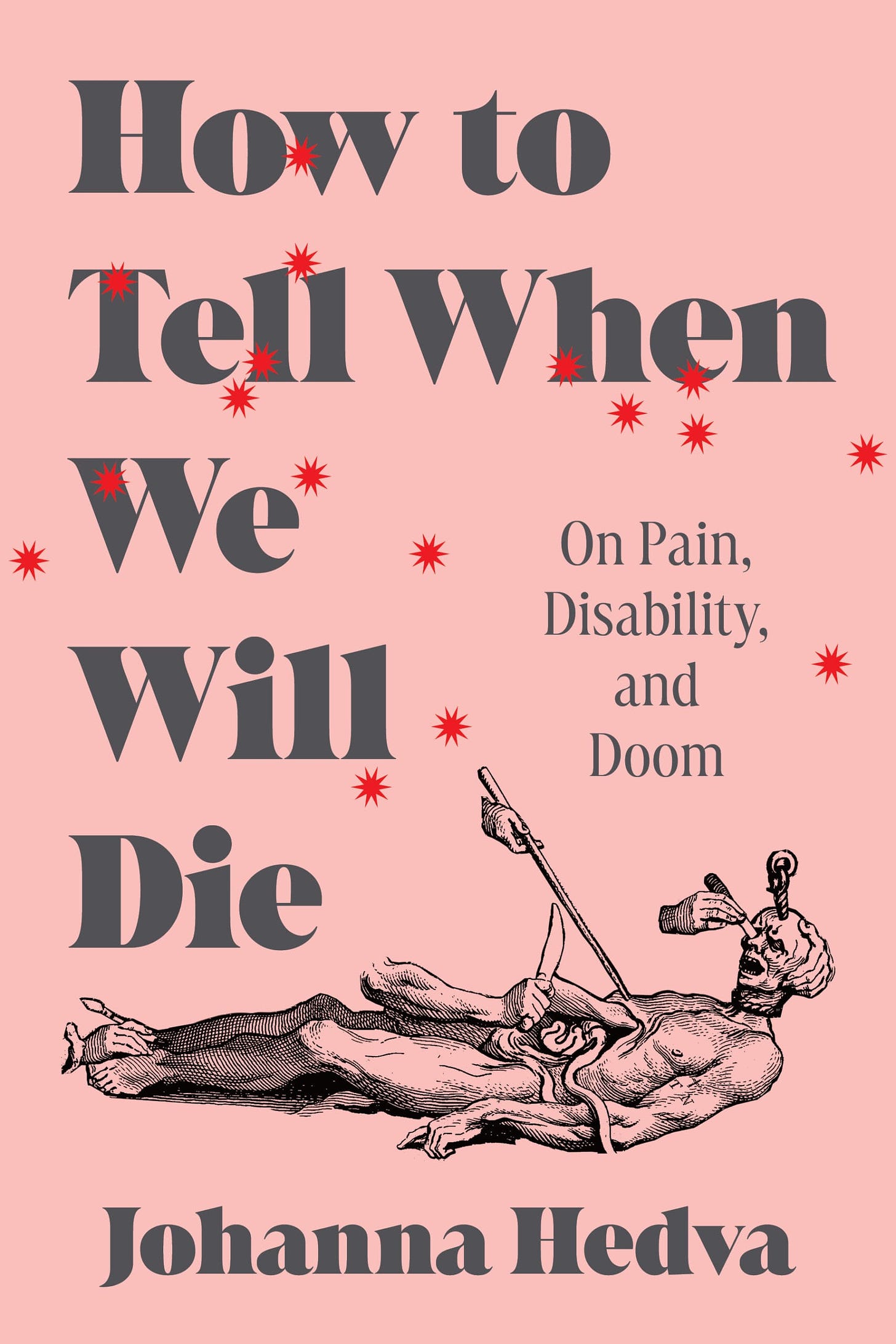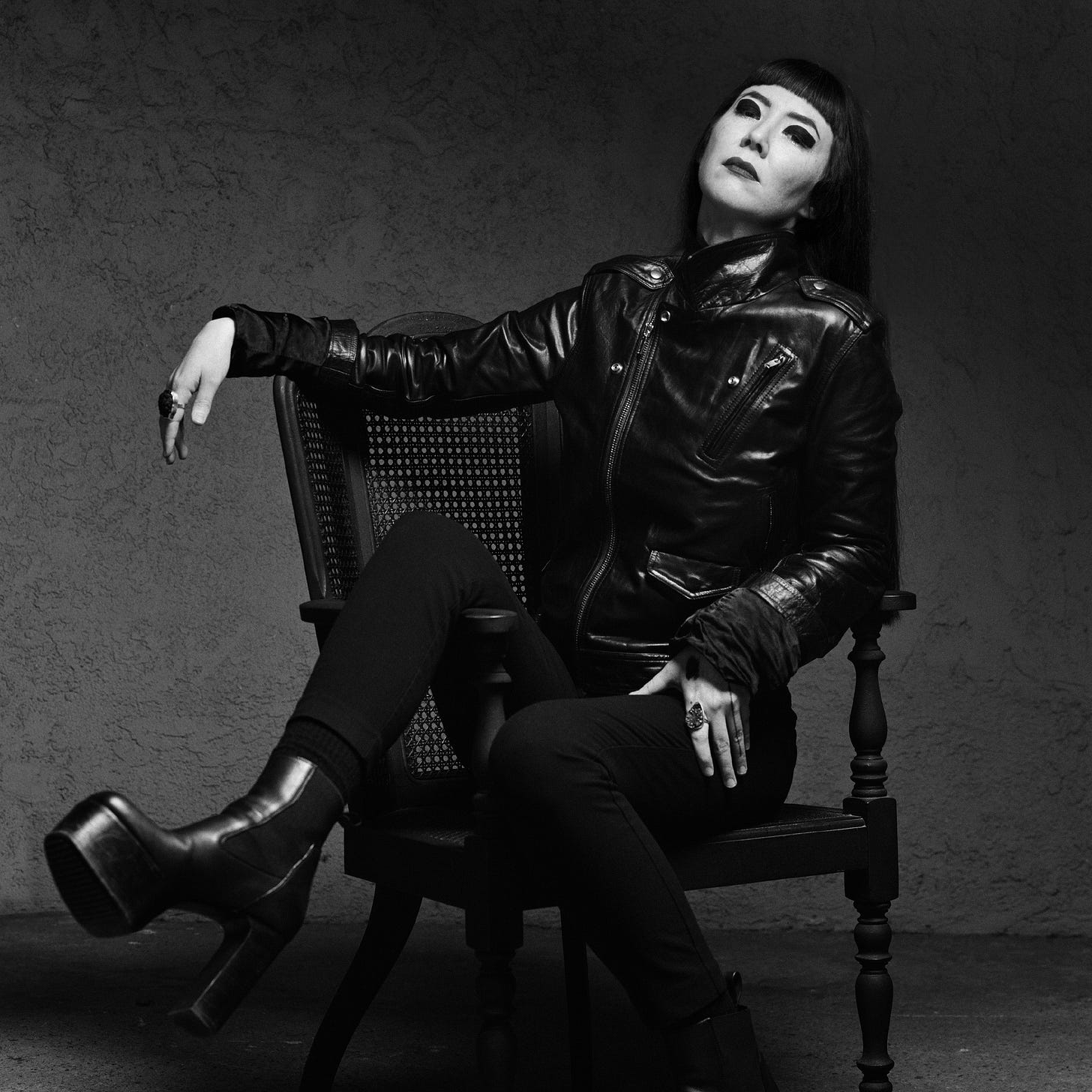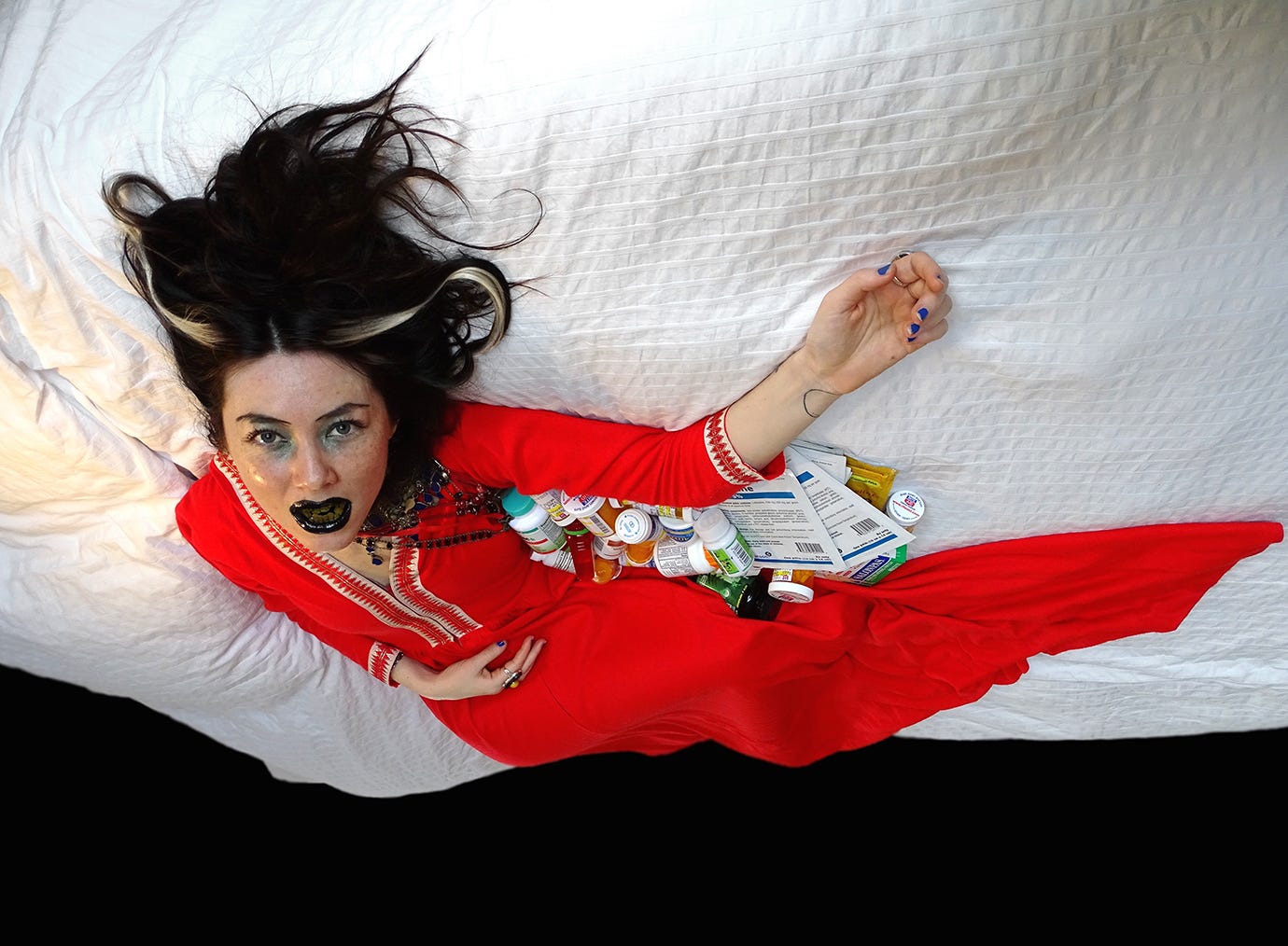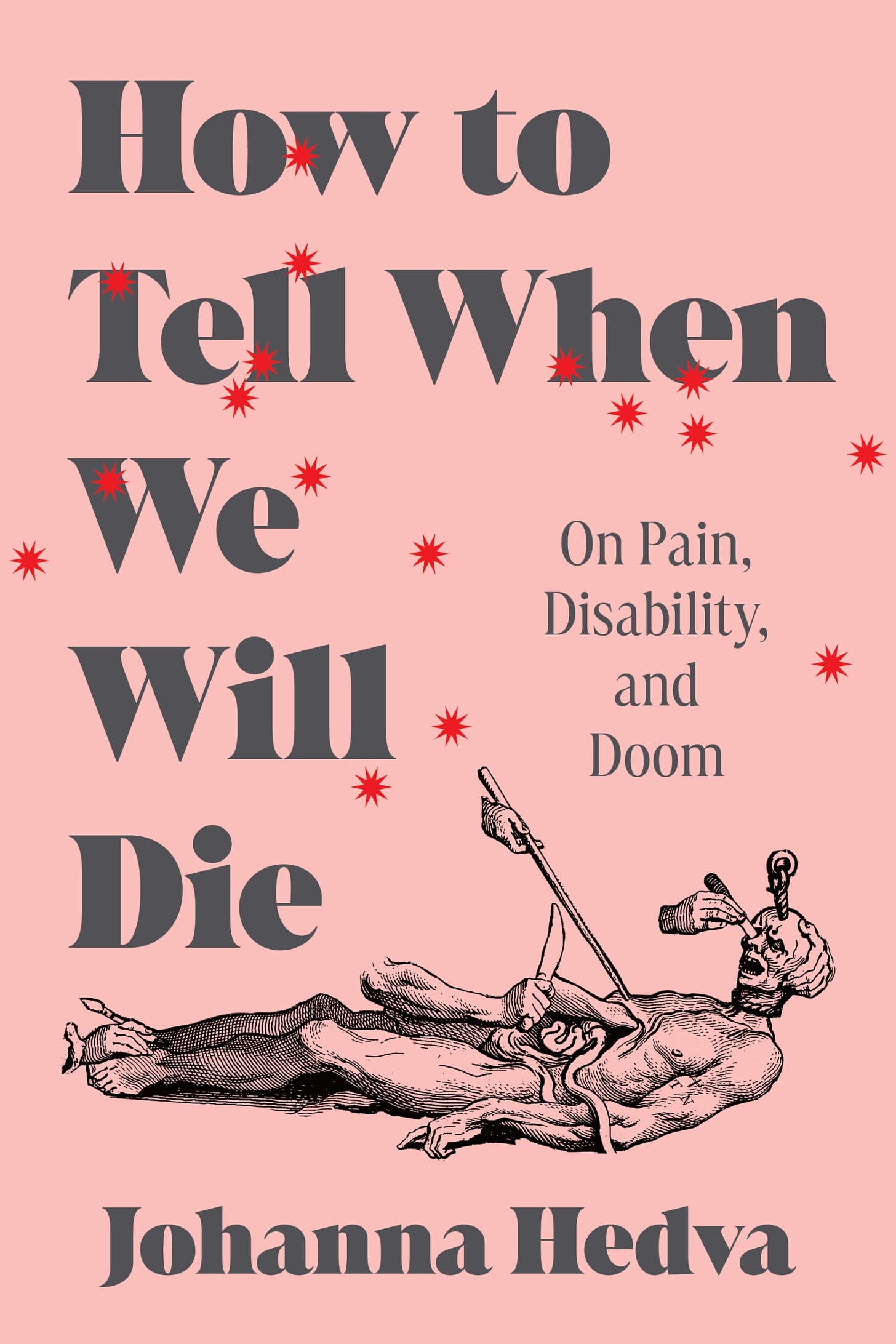

Discover more from Notes from the Void
"Need is the Prerequisite for Existing"
An interview with Johanna Hedva, author of "Sick Woman Theory" and the forthcoming "How to Tell When We Will Die"
I recently sat down with Johanna Hedva to discuss their long-awaited essay collection, How to Tell When We Will Die: On Pain, Disability, and Doom.
Johanna is a Korean American writer, artist, and musician who was raised in Los Angeles by a family of witches and now lives in Los Angeles and Berlin. Their work has received international acclaim, none more so than “Sick Woman Theory” which took the world by storm and upended our notion of chronic illness, politics, and everything in between.
I was lucky enough to attend UCLA at the same time as Johanna and get to witness and immerse myself in their many groundbreaking performances and installations around the city. We share this history, an affection for theory without preciousness, and a desire to see writing about disability move beyond the constraints of ableist expectations. Below is our conversation we had to mark the release of their stunning new collection.

Emily: I love that your book includes a chapter about ambition.
Johanna: It was important to me to have ambition in the book. There were so many times in the ten year period of writing it where I would get frustrated with how the book seemed to feel cramped by “the ableist gaze.” I recently started to use this phrase, “the ableist gaze,” which seems like good shorthand.
Over the course of writing, there were often moments where I would be like, okay, it's a book about disability, so I've got to touch on specific topics and explain them. Like, here are the terms, etc. etc. I would get into that a bit and start to feel really bummed out. The parts that always felt the best were when I asked, could this book have a piece on ambition, or Susan Sontag, or sex, or fighting? I would be like, what else? In a way, I think my project is very simple, which is that I just wanted disability to be more complex.
Absolutely. And I feel like in the whole book, there's a sense of both personal ambition and ambition for what thinking about disability can include, what counts as thinking about disability.
That's absolutely right. I have noticed that there's an eagerness in general to define things within a more limited, narrow definition. This is not only with disability. And I'm just not that bitch! I want definitions to change; I want meaning to change. I want things to be unruly. I want it to be like, look at all these things that disability could possibly be. And then there's also more! That's my methodology.
What do you think you find in unruliness that you're not finding in order or containment?
Well, I feel like personally, as I've gotten older, I get really pleased when I'm delightfully surprised by what I'm looking at. Part of that includes being confused about what I'm looking at, not knowing what it is. And that goes for anything: art, people…. It's not so much that things need to be new. It just needs to be confusing. This is unruliness: it's not in the category or the definition or whatever you thought it was, or what you're used to. I just love that. I don't like to be wrong, but I really enjoy being in an encounter with something where I don't know what it is.
Right. There's a difference between being wrong and being thwarted.
Yes and sometimes being thwarted is exhilarating. I just like it. It’s only getting worse in me. I've reached for a lot of different experiences, and now I'm needing to reach even further afield to get to that feeling. That gets me into trouble a little bit, for sure. Because I'll just be like, what the fuck is over there? It's very enticing and tempting in a way that might not be great. Mostly with people. You know, I have a lot of freaks on the keychain because of this tendency. [Laughter]
But it is certainly also the case in ideas and language. Just seeing a sentence do something I've never seen before. I've been writing 500 words a day, every day for twenty years. And I feel like I'm just starting to get the hang of it. It's really exciting, because now I get to get good at something. There's more to learn.
I'm not a slow writer, but it takes me a long time to get everywhere I want to go on the page. I write hundreds of drafts, all these words every day. What I'm doing during that whole process is not going slow. It's more that I'm making a lot. What's really exciting for me is to get something down on the page, to get the sentence right, and then fuck it up somehow and see what happens. Like, what if suddenly there's a question mark at the end instead of a period? Or what if this word is actually an antonym or a synonym? Thought becomes thinking. It's not that I'm writing to find out what I thought. I'm writing to find out what thinking can do.

One of the things that stood out to me in your writing was this phrase that I believe you've coined, the “blast radius of disability.” As soon as I read that, it just hit me.
Yeah. The first line of that chapter is, “‘The blast radius of disability’ is a phrase that will make demolishing, bone-deep sense if you’re in it already.” It was a phrase that I said some years ago — “here we are in the blast radius of disability.” It's a way of trying to account for how totalizing a change disability is when it arrives for you. Some people are born into it, so maybe they don't have that. But I think for those of us who have disability arrive, there is a haywire transformation that upends. It destroys the entire world that you knew.
The thing about the blast radius that felt important as an image is that it expands in all directions. There's a tendency with ableism to cut your life in half between “before you got sick” and “after you got sick.” But this is not actually true about how bodies work. I think disability makes you have to rearrange yourself in relationship to your past and who you were then. The blast radius of disability is another way to think about time.
By the end of that piece, I was trying to get to this idea that as much as an explosion is a very violent repositioning of matter in space-time, it's also something that expands—there's more space, more volume. There's more. A larger project in the book is me trying to suggest that if we think of our needs as a lack, a scarcity, a problem, a deficit—that means a need is ontologically always there. So doesn't that mean it's really abundant?
“Need is the prerequisite for existing.”
You use the metaphor of a debt a lot. Like needs are not debts that we have to repay somehow.
The value that capitalism and ableism and all these insidious ideologies have placed on the idea of debt is that it's actually bad to be in the red. But we're always in the red! The ontology of it means that it's not just a temporary condition that happens sometimes and then goes away and then you're better again. Need is the prerequisite for existing.
Yeah. If you exist, you're going to need a hell of a lot.
Yeah. I really wanted to use the word “need” in the book because we don't like the word “need.” It makes people very antsy. You tend to hear other words, like “interdependencies,” “access,” “mutuality,” and so on. And that's all fine. I don't mind this. But the root of all of those would be need.
I know in the book you say that you're tired of Freud. But any talk of needs, I'm going to think about the needs of an infant, right? Part of the rejection of needs is the rejection of some infancy that we all went through.
You know, Freud is born a day after me. I just think it's interesting that Marx and Freud were Tauruses. Also Hitler. And Buddha. I'll just pontificate a minute: I feel like what Taurus is about is the conundrum of materiality. There's a thing around Marx, Freud, Hitler, and Buddha that has to do with the problem of the body and what to do with it. Materiality in a Marxist way, like means of production. With Hitler, he needed to eradicate bodies, not only identities.
I always joke with my clients, like if anybody could just sit under a tree and do nothing and find enlightenment that way, it's a Taurus. It’s Buddha. Chillin', you know? There's something about this conundrum of having a body—the double-edged sword of it—that I think is central to Taurus problems.

I mean, the body is the thorn in the side of capitalism. And so much of your book is about the way that capitalism influences our self-conceptions, the way we move through the world, the way we can or can't connect with other people. There's a very strong Marxist, anti-capitalist thread throughout all of your analysis of disability and community more generally.
Yeah, because if capitalism paid for care, it would be the end of capitalism.
That's not my own idea. That's an idea that works through a lot of strains of radical leftist abolitionist thinking. Capitalism as such is powered by a carceral logic, a debt logic, a scarcity logic, and that can't include care. You can't have a prison and care. That does not get reconciled. You can't have a huge budget for war alongside a huge budget for health care. It's just not even possible under capitalism. The reason is because if you think that we need all this money for weapons, there's no way you could include a budget for care that looks like the way care should look.
The only way care could look under a capitalist regime is carceral, is punitive, is curative. It won't look like care. That's not what care is, actually. I don't even think care exists anywhere under capitalism. The systems that we do have are not actually care systems.
So where does the possibility of rogue care fit in? What are we doing when we scrape together care for one another?
I really feel like nobody knows what real mutual aid and care look like in practice. And that's not anybody's fault. Why would we know that? We are literally having to cobble it together fugitively in a rogue state, with grassroots, DIY, collective care, mutual aid, etc. We're trying to model only on negative examples. Leah Lakshmi Piepzna-Samarasinha, who's a friend and a fucking icon in disability justice, has written that “mutual aid is not charity.” There isn't a superiority or a hierarchy of “those who have” who give to “those who have not.” In mutual aid, the idea is that everyone lacks something that they need.
“If capitalism paid for care, it would be the end of capitalism.”
I want to return to this idea of the ontology of the body and need as the basic foundation of life. In the essay in the book, “In Defense of Depersons,” I was really reminded of this quote from Frantz Fanon in Black Skin, White Masks: “any ontology is made impossible in a colonized and acculturated society.” How does Fanon's work tie into your own?
I love Fanon. When I first encountered Black Skin, White Masks and then The Wretched of the Earth, it was a huge touchstone. There’s certainly a lineage in my book from Fanon through thinkers who are trying to deal with the condition of colonization; Denise Ferreira da Silva, for example, saying that the self cannot emerge in relation to. But any marginalized or oppressed identity is emerging in relation to!
When I was writing that chapter, I was working with Fred Moten, who was really so sweet and so generous to me, because he read Sick Woman Theory, and he told me I have to be careful about relying on the universal. And he was totally right. The Sick Woman in the original version really did rely on an idea of a universalist subject that the Sick Woman could be. I was just replacing one for the other of a universalist, consolidated subject.
Fred's “Blackness and Nothingness: Mysticism in the Flesh” is really in the DNA of my chapter. He's mostly trying to deal with Afro-pessimism, but Fanon is in there too. That was the first piece that I read that had a mystical connection into something like nothingness or the void. Neither Fanon nor Ferreira da Silva really go into this spiritual element, which isn’t bad, but Fred’s essay is the first time I thought of it in a mystical way. If you emerge in relationship to, and that means you don't have a self, what does that mystically produce? If you're a deperson, what does that do? Where do you live? Because that's the thing that's interesting about the undercommons: We all live on the same planet, but some of us are in the undercommons.
When you find yourself located in this position of the deperson, there seems to be at least two paths you can go down: You can embrace the depersonhood in some way, or you can find a way to re-person yourself. And I'm curious what you think of those two paths.
That's probably right. I think the re-personing impulse is strong because how else are you going to survive? The mandate to re-person is very strong in a lot of different ways.
Just consider the psychiatric perspective, which is also what Fanon is talking about. It's almost an edict or a law of psychiatry to make you whole again, right? And I think that there's been a lot of really great work around how that's really impossible for certain communities, certain groups. Samah Jabr, Head of the Mental Health Unit at the Palestinian Ministry of Health, for example, discusses how PTSD is a Western concept. There's a traumatic event, and then you recover from it and it's in your past.
But that does not exist for Palestinians. The thing that gets tricky in a Western medical industrial complex psychiatry is that PTSD is a very expansive diagnosis that can be given to the victim of the trauma and the perpetrator of the trauma. You know, the soldier gets the PTSD diagnosis for inflicting violence upon the colonized. It would be useful to do a little differentiation.
How has the ableist gaze emerged in the reception of your work?
When “Sick Woman Theory” first came out, it had its little viral moment. There were a lot of bitches coming to the yard with offers, and they wanted to give me a little parade. And I was very freaked out by it because all I could see in it was the ableist gaze. It was really difficult to also see the cool, cute people in here that weren’t gazing at me through ableism. They're also here. And we're doing it together.
By now, I kind of expect the ableist gaze to be there, but it doesn't harm me as much or wound me as much as it did. It’s already happening, actually. A pre-publication review of How to Tell When We Will Die came out and said that the book was a “hard read” in places because I discuss being physically abused as a child, and then later developing what the reviewer called a “preference” for “masochistic sex.” And I was like – hang on! Important error! I like to punch men. I’m a top, I’m a pro-domme. This is importantly different.
As I’ve reflected on this review, I’ve noticed that if the ableist gaze is there, someone who would be the Sick Woman on page one, it's hard to reconcile her on page fifty punching men consensually, or being in a position of any kind of power, or even being in a position of pleasure. It's hard to reconcile this as a character development, because the story of disability is only ever told in one way, maybe two if you're lucky, but it's essentially the same story, which is that disability sucks. And that's it. That's the story.
There's an idea throughout the book that individual bodily sickness has a relationship to political sickness, sickness in the body politic. And this is just straight from Aristotle, basically. Do you think Aristotle was right about this? Did the ancient Greeks get anything else right about this that you want to add in?
I'm so pleased that you noticed this about me, because I really am an Aristotelian at the end of the day. One of the things that I really like a lot, and Aristotle was my first encounter with it, is how different 5th century BC Athenians would have understood the mind.
The book that I read recently on this topic that really changed my life was Ruth Padel's In and Out of the Mind. She's like a more gory Anne Carson. It's so fucking fabulous because think about it: you've got an entirely different worldview in the 5th century BC. You don't know what the liver does versus the gallbladder, right? This is also pre-Descartes, so you do not have a mind-body distinction. Your world is populated by gods and goddesses who are in everything and everywhere, and so they speak to you through different means. The Ancient Greeks wouldn't even think of it as supernatural—they would think of it as natural.
Something that Padel discusses in that book is how there wouldn't have been a distinction between not only thought and emotion, but also the body as its own discrete unit that's not part of and very intertwined with the life of the polis. There are also ways that the Ancient Greeks understood emotions in a social way and a political way that's not just like my interior, personal, private feeling of rage or joy or lust or whatever it is. They do have an inside and an outside concept, but it's not a barrier—it's more like a thoroughfare.
There are all kinds of problems with this, of course. It's one of the ways that they could perpetuate injustice and slavery. But it's a different understanding of the body that feels more intuitively to make sense of how the body feels. Here's a good concrete example: all of us are just dealing with unbearable despair and rage when we look at what's happening in Palestine. And then we just have to carry that around and go about the day. You go into your therapy appointment and there's not a discussion of the social-political context of anything. They ask, “what did your mother do to you?” And, “Can you re-pattern your behavior?” And I'm just like, there's a genocide happening now! That's the reason I'm fucked up, you know?
This is not to be romanticizing the Ancients, because that's also dangerous. But I do think that there's something to be gained from this idea that there isn't such a hard boundary between these places that are actually more liminal or full of exchange and influence each other.
How does Covid fit into your work, into your analysis of disability, into the cis-hetero, capitalist, white supremacist conditions that we live in?
It's really interesting to live through Covid as a sick person because there was a moment in the very beginning of the pandemic, like March 2020, where the world stopped and just seemed to change. And there was a moment in that where I feel like a lot of us, and by “us” I mean people who were disabled before Covid, were like, maybe people will finally start to understand how ableism works and how care could look different, how we could do it differently. Because the virus demanded that we did it differently.
I think what happened was that we got to see in real time, first of all, how hard care is to do and how we really have not built our world to do it. It was so hard to do. It was hard to do in every way. Everybody's life got miserably difficult, and that's not because Covid changed things. That's because the systems that we've built just kept working, but now care had to be a priority, and they couldn't do it. The world could not support care as a priority.
That's why it was hard in the early days of Covid. Ableism just rose to meet Covid and to smother it all again. I remember a friend of mine saying the world's just going to get a bit more crip. And I do feel that some people came over, or they entered the blast radius of disability themselves, and now they're here and we're all still in Covid.
I'm reading a Jacqueline Rose collection of essays called The Plague. She deals with Camus, Freud, and Simone Weil and their lives and works about the Spanish flu, which was very similar in a lot of ways to Covid. It's also completely erased and forgotten as a historical event. Everyone talks about the wars of the early 20th century, but no one talks about the huge pandemic that wiped out more people than the wars. This is what's happening with Covid now.
Ableism is the reason that we can erase Covid and forget it so completely. “Oh, it wasn't that bad.” Or: “It was really bad, so let's not think about it.” You can see ableism in action, even about memory.
I am writing a piece on memory right now, just because I'm so fascinated by the way memory of the pandemic has been used to erase it, to distort the present.
This is the thing that I always want to concede: ableism does give us some stuff that it would be hard to live without. I get that forgetting about Covid is helpful just for some basic survival things, being able to just get out of bed every day.
I'm reading Be Not Afraid of Love by Mimi Xu. There is a good chapter on numbness and what numbness does, and how there's a lot, actually, about life that needs a certain kind of numbness to things. But she says the problem is when you start to manipulate numbness to last longer than it should. She says this really interesting thing, which is that numbness is actually preparing you to feel abundantly. I do think there was a certain amount of numbness that was needed after Covid began just to be able to not be in fight-or-flight mode all the time. I understand why people are forgetting it. I understand why that is important on some level for some time. But I think we're manipulating that to last longer than it should.
A lot of your early artistic work involved small spaces: Odyssey Odyssey, the secrets box at UCLA, the Ride Alongs. What was your interest in small spaces? Has that evolved as disability has visited you?
There definitely was a fascination and a kind of insistence on small spaces. I remember for a while my artist statement on my website said, “I am going to make big things,” and then I had struck through “big” and wrote “small.” I'm gonna make small things. I think for a while there was definitely a rebellious contrariness around the impulse of artists to take up a lot of space, to kind of manhandle unwieldy materials like steel or plexiglass or fucking neon or whatever. I was just, like, “no.” It just struck me as being something dude artists did, and I loved this idea that scale could be played with. I wanted to make huge worlds in little spaces.
I have changed, though. During early Covid, I was in a show in a museum and I wanted to build a tiny little room. We were joking that it was the toilet to hell. It was a dark, cramped, small, closet-sized room with a quadraphonic immersive sound set up and a bench that you could lay on. The bench was covered with an anti-fatigue foam, which is a really evil capitalist invention where you stand on it and you don't feel the fatigue of your body if you're a worker in a factory. Then the room just, like, screamed at you with the score of my own voice and an AI voice. But I remember making it and realizing people couldn’t come in it because of Covid. Because it had been proposed before Covid, and then by the time we were going to make it, it was, like, “how are we going to do this?”
In the end, I made a video game that was online for free. I think what started to happen to my work as a visual artist is to really think about space in an absence and presence way rather than a scale way. There's still scale, but there started to be a way of trying to think about, what if you can't even come to this thing? Then what? Could it exist?
Just very recently, I started to make objects, which feels really weird. They're all very tortured-looking Hedva objects. I don't know what my new relationship is to space, but I have noticed that I prefer there to be more now.
I just want to note that you’re saying this with a zoom background of outer space behind you, which looks quite vast. You’re in your vast era!
Yes! I’m in my vast era. The last few weeks have been a nightmare of Mercury retrograde—everything that was supposed to happen has not happened that way. I’ve been joking that it’s a good thing I’ve surrendered to the allness of the nothingness of the totality. I’ve just dissolved completely. [Laughter]
Tell me all the things that the Sick Woman can do with her fist.
Oh my God, I love this question. You know, my new album is called Fist. And I'm really excited about the merch. I just want it to say “Fist Hedva.” The cover of the record, the tote bag, the t-shirt… Fist Hedva. I'm a huge fan of fisting, if that was not already apparent. There's a fisting scene in the book, for those of you who haven't read it yet and need some reason to read 400 pages about disability.
I'm a big fan of fisting. And I love thinking of fisting as a metaphor for so many things. Not just in kink stuff, but also the Black Power fist, just the image of the fist. It’s so jarring to me on the internet if I ever see someone use the fist emoji and it's a white skin tone. I'm like, ack!!
I'm a huge fan of the UFC. There's a whole essay in the book about that. Non-ironically, I love the UFC. I love it! They talk about a fighter's fists being their weapons, and that they need to control them. There's a woman who just retired, sadly—Amanda Nunes. Greatest of all time. Champion in two weight classes. Queer. Her wife was her coach. Fucking love Amanda Nunes. “The Lioness,” that was her nickname. And her fists! The commentators would say she had the best ones in the entire league, gender aside. She was the knockout artist in the league.
One of the things that the ableist gaze doesn't really allow a Sick Woman to be is powerful. She could maybe be a fighter battling her cancer and overcoming it, but she doesn't really get a fist, you know? She gets a battle but no weapon.
Thank you so much for this wonderful conversation, Johanna!
It was a pleasure!
Johanna’s book, How to Tell When We Will Die, comes out September 24 everywhere books are sold. It blew my mind, and I know it will blow yours too.
Subscribe to Notes from the Void
Writings on the moral psychology of the pandemic, ethics in the midst of collapse, and collective memory, from the founder of Clean Air Club.
















